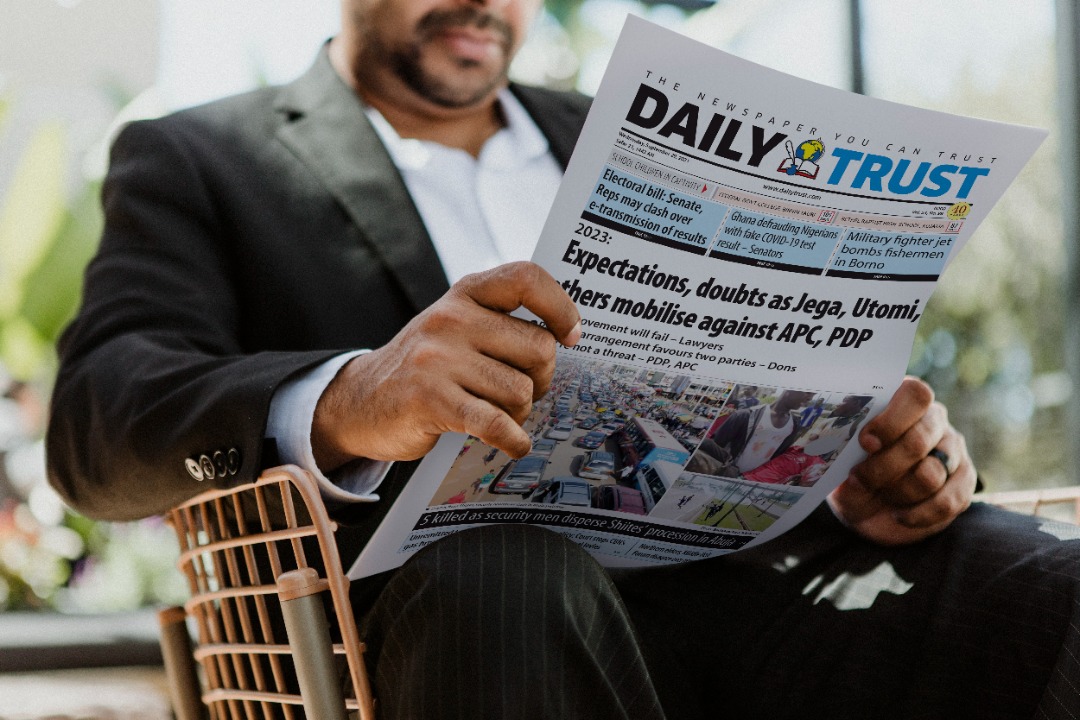The speakers and panelists at the 19th edition of Daily Trust Dialogue held on Thursday, January 20, 2022, dissected the besetting challenges facing Nigeria on the heels of the 2023 democratic elections. Chaired by former Head of State, Abdulsalami Abubakar, with the Sultan of Sokoto and President of the Nigeria Supreme Council of Islamic Affairs, Alhaji Muhammad Sa’ad Abubakar III, as Father of the Day, the Dialogue was unanimous on the worry that insecurity has remained intractable and a challenge to 2023 elections because the elite have not demonstrated the political will to overcome it.
The Sultan of Sokoto captured the significance of security to national development thus: “Without security, you cannot have anything and you cannot even worship the Almighty God the way you would want to…” Panelists challenged governors on the importance of working closely with the people affected by insecurity in their states, critically studying the causes of conflicts and their manifestations, in order to proffer pragmatic solutions to them. This measure is recommended because of the apparent knowledge deficit about banditry, leading to the preponderance of the military approach in tackling it.
The anomalous leadership recruitment process in Nigeria, which throws up incompetent, corrupt and unsuitable persons for delicate political positions is largely responsible for the failure of governance across the three tiers of government. Lamenting this misnomer, speakers and panelists at the Dialogue advocated that, as the country enters into the 2023 general elections, political parties must be deliberate and intentional in deciding those who fly their flags at all levels.
Dr Hakeem Baba-Ahmed, the spokesman for the Northern Elders Forum (NEF), made this point succinctly when he rhetorically asked: “What qualifies the current class of governors to become governors? How does a country of 230 million to 250 million people end up with the kind of people with so much power as governors? There must be something really broken about our political system, our democracy that isn’t working. It is throwing up the wrong people to occupy and carry huge powers. Ninety per cent of our governors have no business being anywhere near power… They don’t have the preparation, the background, the competencies to be governors, and yet because of the democratic processes they won the elections… We have the wrong people wielding power over people that are desperate for new and effective leadership.”
Governor Babagana Zulum, proffering solutions to the abnormal leadership recruitment process in Nigeria, argued that the situation is so urgent that political parties must not consider the 2023 election as business as usual. He suggested thus: “Can we sit down and select those people that are competent enough to rule Nigeria in all political parties, irrespective of their inclination so that opportunities could be given to them to rule this nation? Otherwise, we allow tribalism, nepotism, among others to take over what we need to do in a real sense. We should work together as indivisible elements to move forward. What matters is the future of Nigeria.”
Closely related to the abnormal leadership recruitment process is the massive corruption that has continued to drain the resources needed for national development into private pockets of those in the “top echelons in the bureaucracy of the ministerial and departmental systems.” Governor Zulum hit the nail on the head by saying hypothetically, “We need to do something about over-invoicing and improper bills of quantity. You can see a project of N10 billion in Nigeria, but somebody will go and quote it for N50 billion.” In spite of the fact that the government, since 2003, has channeled a lot of money into the battle against corruption, it is clear that its ‘Return on Investment’ has not been measured. That is why perhaps, one of the hindrances to the fight against corruption in the country remains the lack of the matrix to measure the effectiveness of the measures taken to address it. This position was emphasised elaborately by a former Chairperson of the Federal Inland Revenue Service (FIRS), Mrs Ifueko Omoigui-Okauru, the lead speaker at the Dialogue. The battle against corruption must be taken seriously because this evil truncates the realisation of Nigeria’s potential in every facet; we ignore it at our own perils.
Also, former Vice President Atiku Abubakar emphasised the need for the selection of competent leaders who would bring together all other components of the society and ensure the nation develops.
The views expressed at the 19th Edition of Daily Trust Dialogue align with the positions of this newspaper over the years. It is high time the elite and political leadership adopt new models in dealing with the spate of insecurity and other pressing issues as Nigeria prepares for the 2023 elections. No doubt, our current strategies are not working; we need fresh and dynamic strategies.

 Join Daily Trust WhatsApp Community For Quick Access To News and Happenings Around You.
Join Daily Trust WhatsApp Community For Quick Access To News and Happenings Around You.


